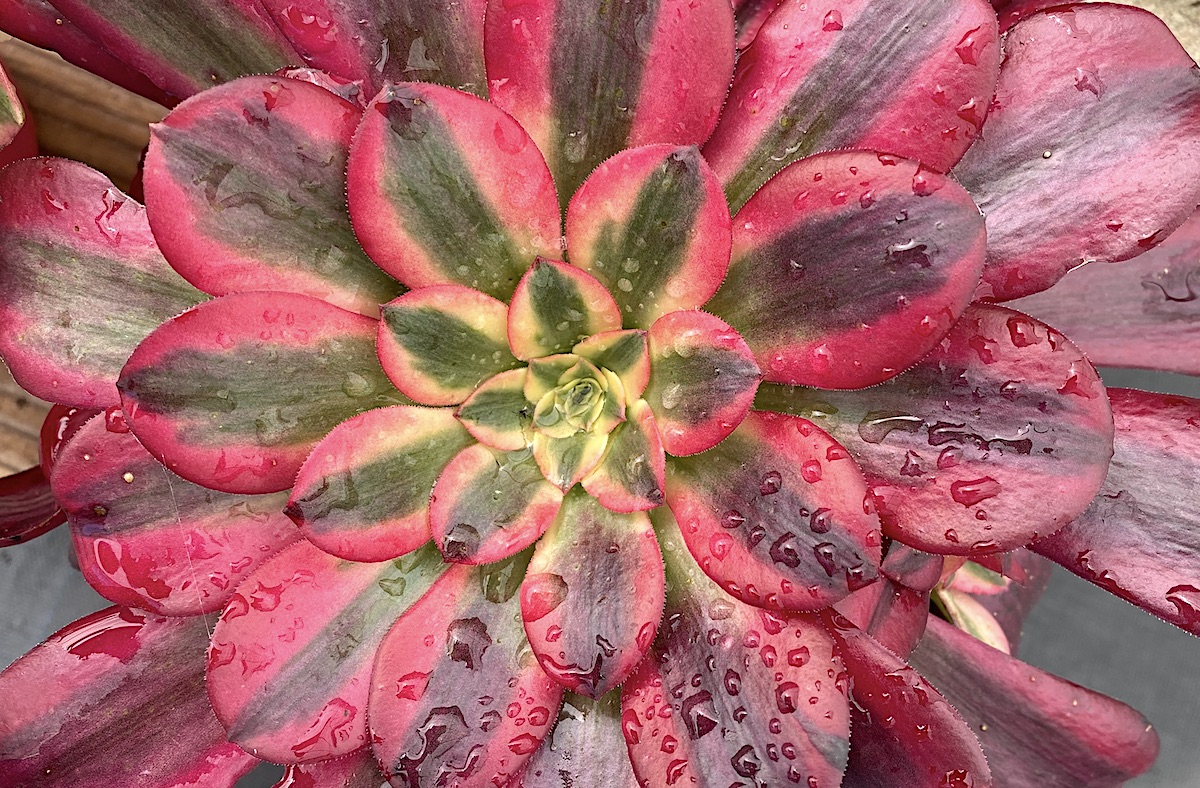
Red and Pink Aeoniums, Varieties and Care
I was excited to see "Carnival" Aeonium cultivars at Oasis Nursery in Escondido, CA. A spokesperson for Altman Plants (which owns Oasis) told me these pink-and-ruby beauties "are going out to garden centers as a limited item through April."
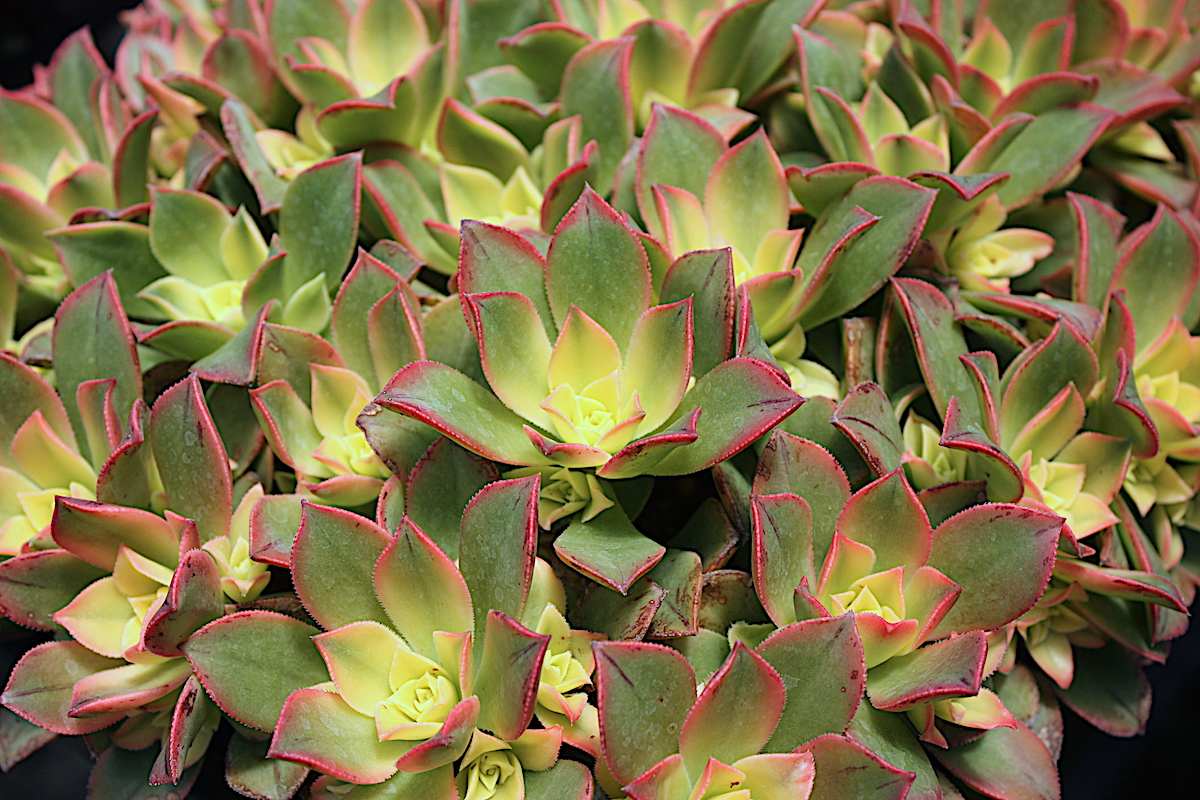
Aeonium 'Kiwi'
To create new hybrids striped with red, pink, cream, green, or yellow, breeders likely crossed dark red Aeonium arboreum 'Zwartkop' (or brighter red A. 'Garnet') with variegates like A. 'Sunburst', A. 'Emerald Ice' or A. 'Kiwi'. The results, selected over many seasons for exceptional beauty and vigor, are here at last.

Aeonium 'Fiesta', an Altman Plants patented introduction
He also pointed out that their multicolor leaves are reminiscent of Altman's own 'Mardi Gras' and 'Fiesta' introductions.
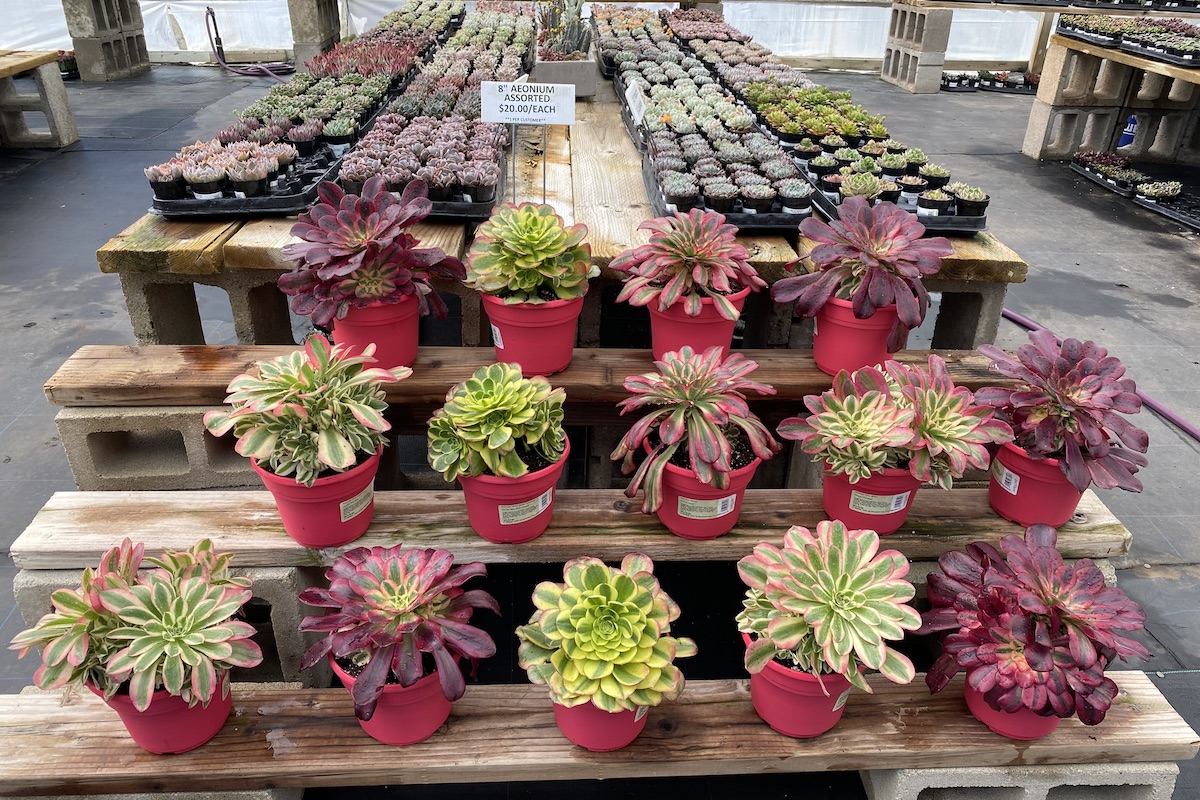
Carnival aeoniums at Oasis Nursery, Escondido, CA
Caring for Carnivals
Typical of succulents that blush when stressed, red-variegated aeoniums need lots of light to maintain warm hues and tight, symmetrical rosettes. The less light, the more open, looser, and greener the rosettes.
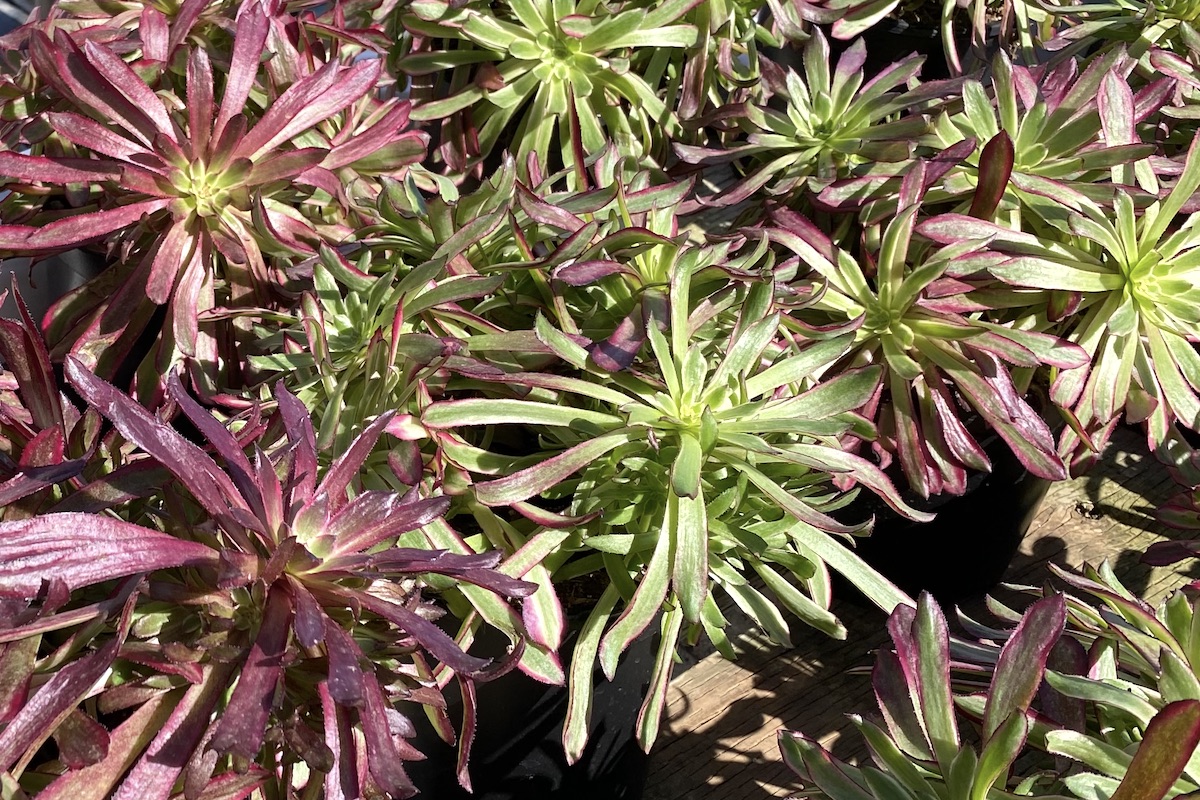
Aeonium 'Mardi Gras' (patented by Altman Plants), above and below. Rosettes show more red or green depending on how much light plants received prior to being on display.
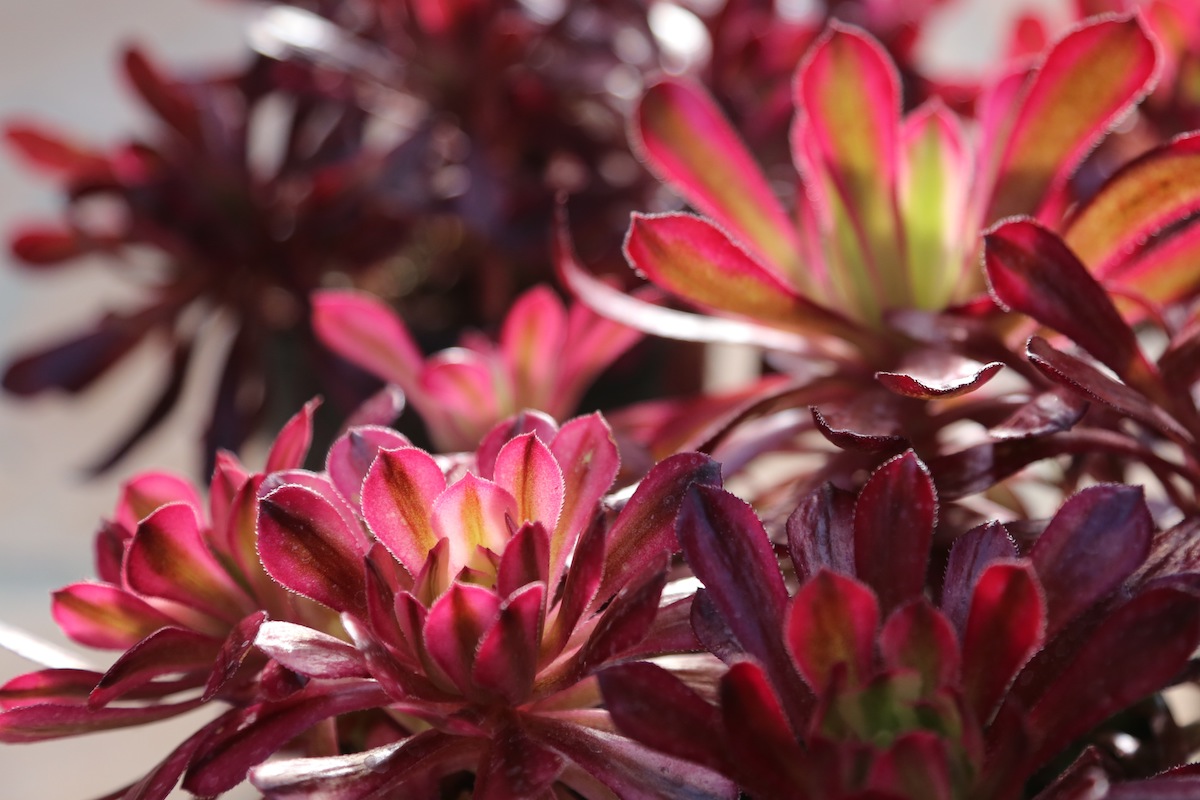
'Mardi Gras' with ideal light exposure
It's a balancing act to give them adequate sun to hold their color, but not so much they burn. This is especially challenging with cream-striped varieties, because minimal pigment makes them more vulnerable.
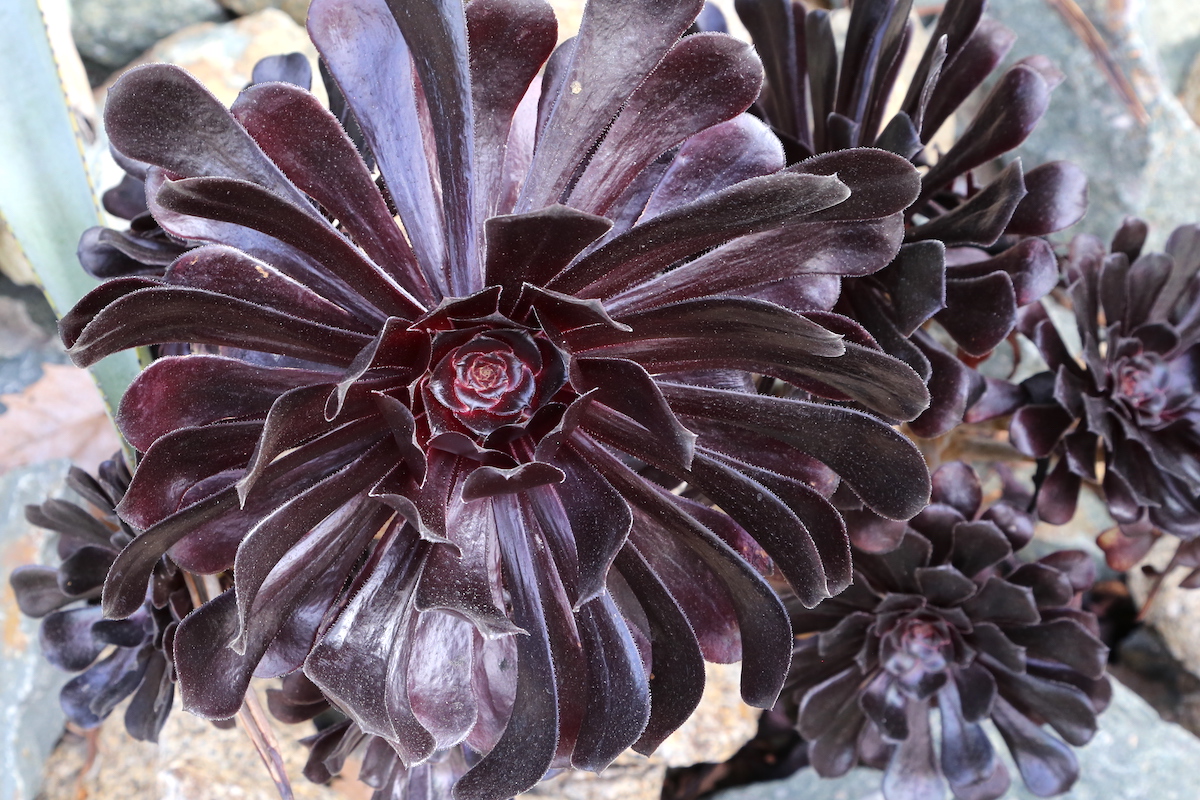
Aeonium 'Zwartkop'
Dark pigment and a glossy, reflective sheen are why near-black A. 'Zwartkop' can handle full sun in summer, while yellow-and-green A. 'Sunburst' requires dappled shade.
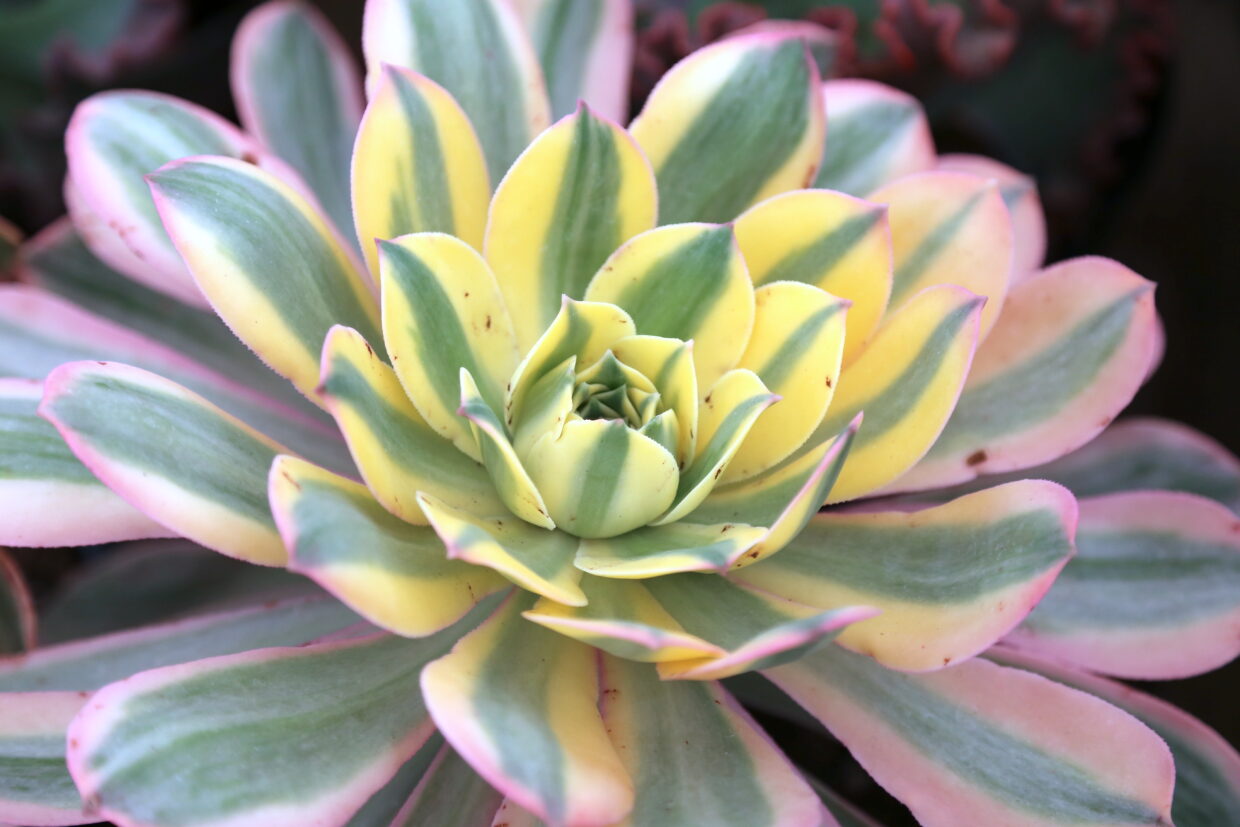
Aeonium 'Sunburst' grown in optimal light blushes pink on its edges
Care varies depending on location, climate, and time of year. Aeoniums in general thrive along the CA coast, especially where mornings and evenings are overcast, temps stay below 80 F, humidity is low, and there's no rain in summer (similar to their native Canary Islands).
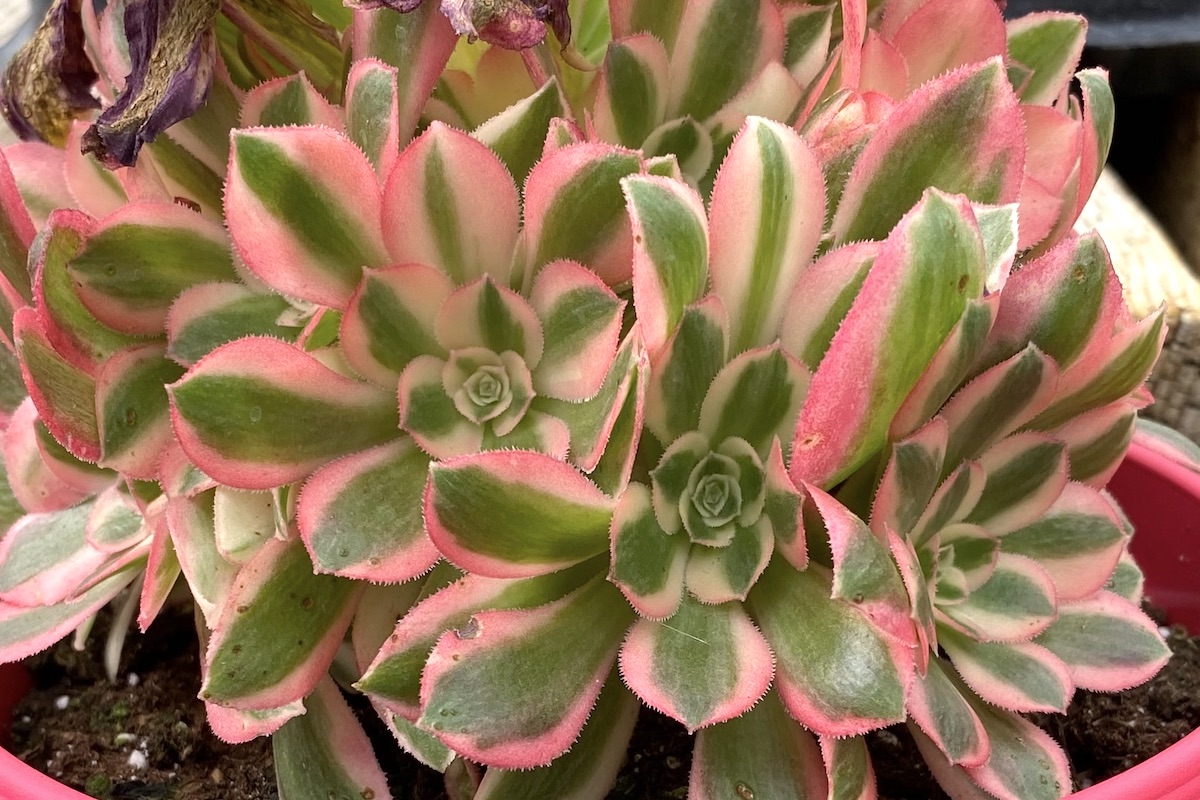
Carnival Aeonium 'Pink Witch'
Avoid giving multicolored varieties direct hot sun on long summer days. Bright shade---the brighter the better---is best.
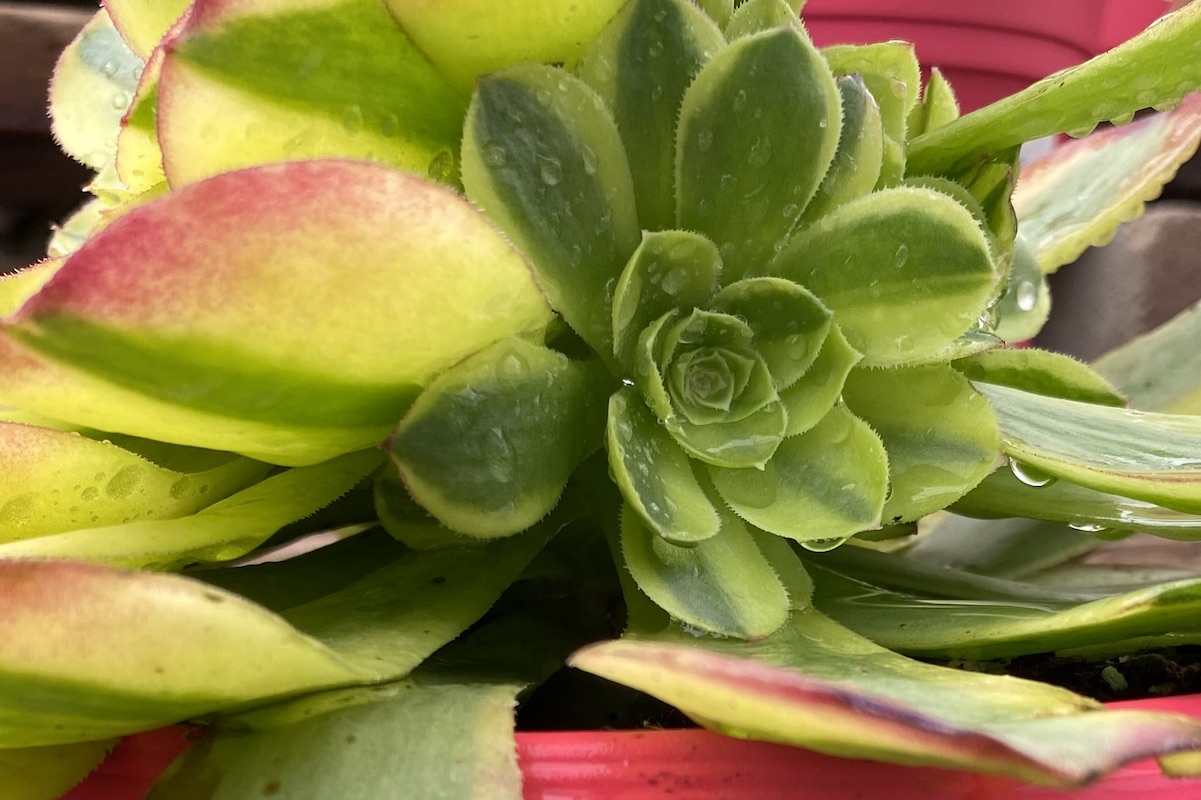
Aeonium 'Milky White' Variegata is striped with light and dark green, cream, yellow, and red.
Keeping them red
Red, orange and pink hues in succulents tend to be transitory because the plants produce those pigments for protection. Leaves will etiolate (grow longer and flatter) if needing more sun, and stay short if getting a bit too much (which is called being "stressed," a positive phenomenon.)
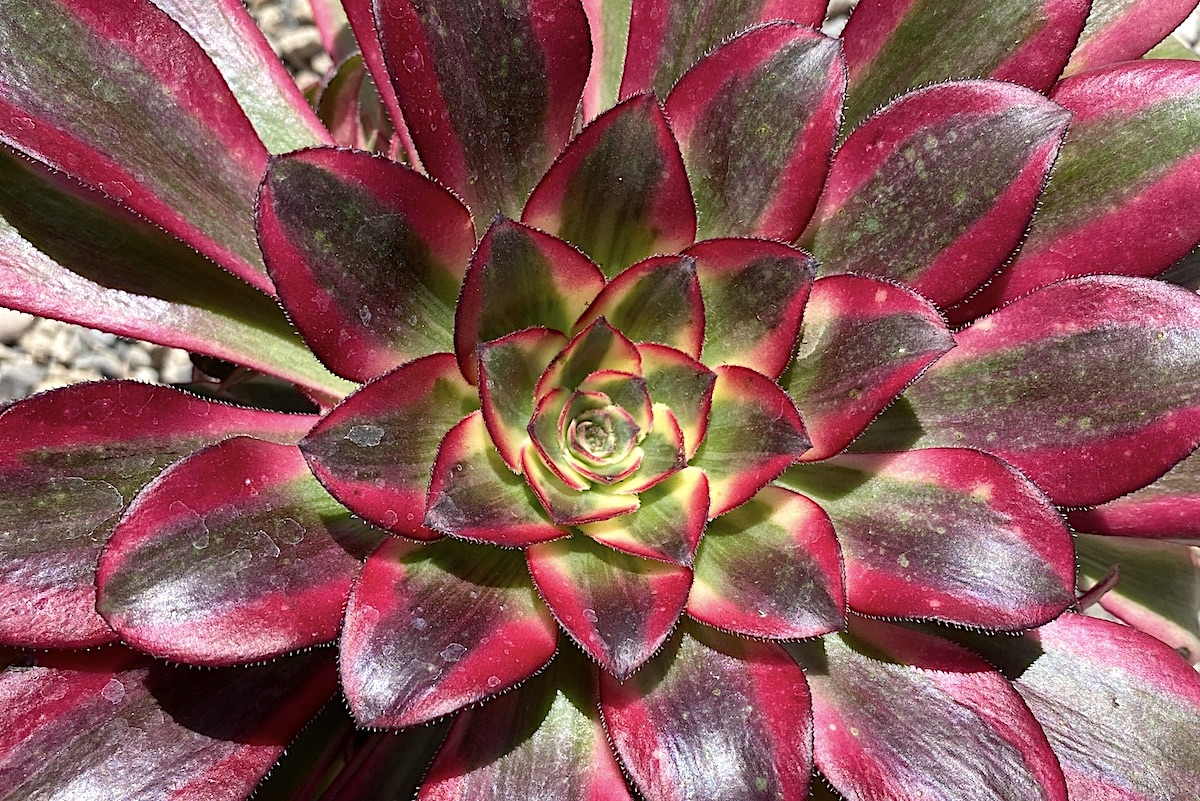
Carnival Aeonium 'Medusa'
Carnival aeoniums, because they don't have fat leaves like jades or aloes, are more fragile and therefore more difficult to keep looking good.
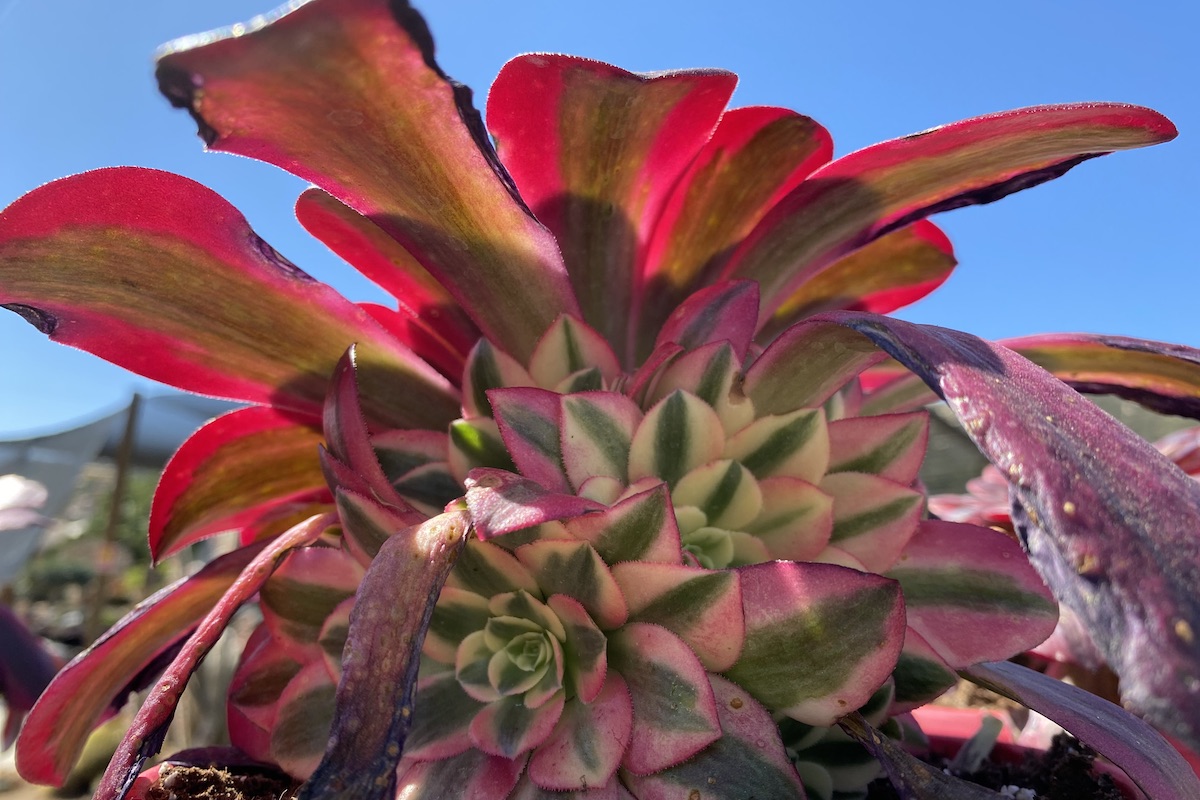
Thin leaves are susceptible to damage from sun and abrasion. Aeonium 'Emerald Ice', which also forms stem offsets, is likely a parent of this one.
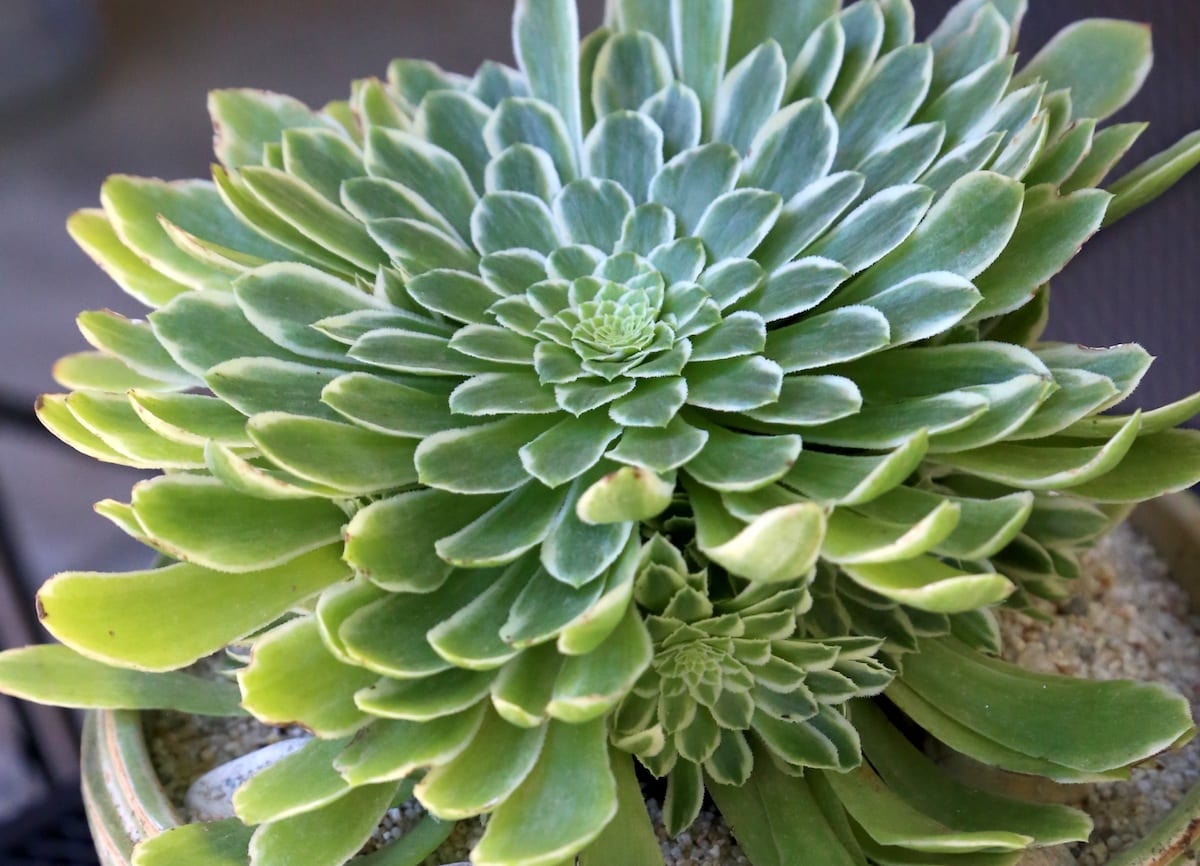
Aeonium 'Emerald Ice'
When a succulent you purchased for its rosy hues loses its vibrancy and reverts to green, how can you help it regain its color? Gradually lengthen its sun exposure. Think of its leaves as pale skin that you want to tan but not burn.
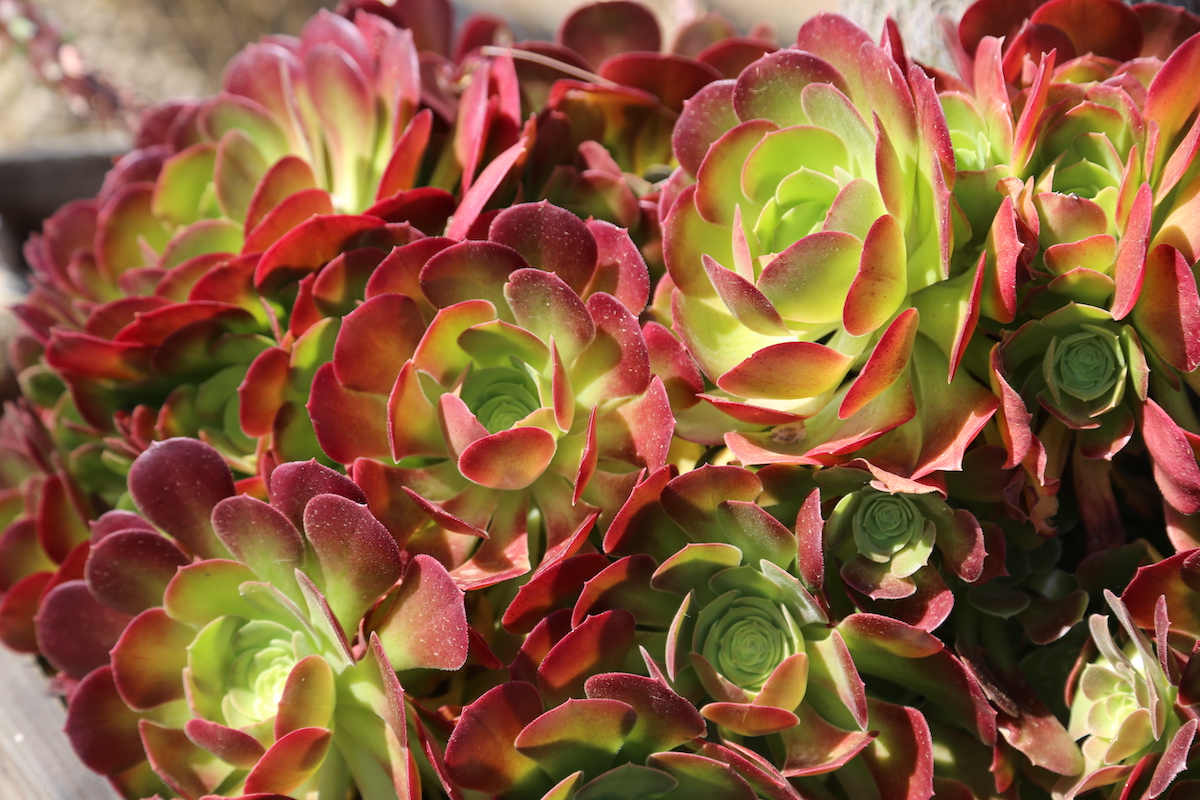
New leaves in the center of Aeonium 'Garnet' rosettes will redden as they mature, providing they get adequate sun.
Leaves, like skin, produce pigment as a sunscreen. Sunbathe the plant for five or 10 minutes at first, then increase daily exposure until it's in bright but not intense sun for half a day.
Once a variegated aeonium's leaves become long and floppy, they're not going to shorten. But oldest leaves do get replaced over time. With optimal light, new growth from the center of the rosette will be colorful, tight, and symmetrical.

A 'Sunburst' rosette originally grown in low light has long older leaves. New growth at center is short and colorful, due to the plant transitioning into brighter light.
Are candy-colored aeoniums too finicky?
At present, I consider Carnival aeoniums long-lasting floral arrangements with gorgeous foliage that resembles flowers. I'm hoping they'll prove tough enough to go in the ground.
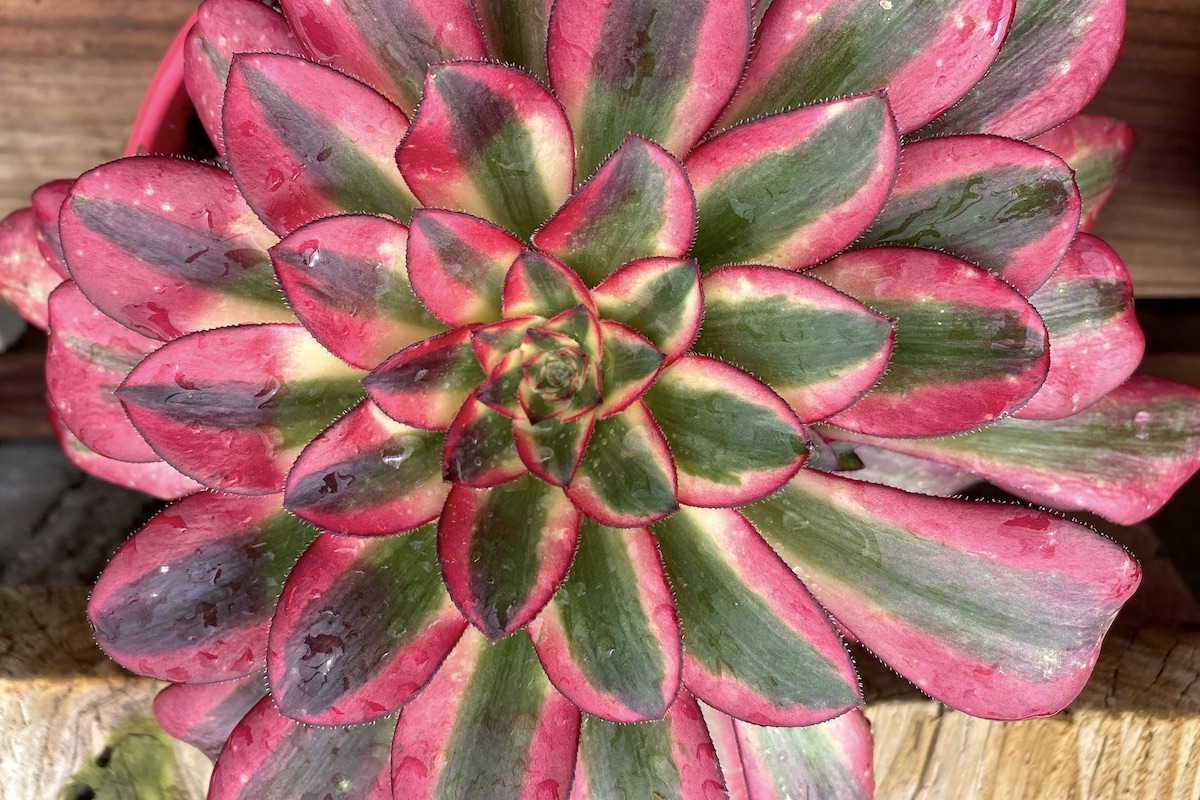
Carnival Aeonium 'Chanel'
Btw, Altman's spokesperson also mentioned "they seem to not go through summer dormancy like the typical aeonium." Sounds good to me, although my aeoniums don't go dormant unless bone dry. It seems prudent to keep such showy variegates moist (but not wet) in summer.
Related Info On This Site
Aeonium Uses, Photos, IDs, Varieties
Aeonium Uses, Photos and Varieties Native to the Canary Islands and Morocco, aeoniums thrive outdoors in zone 9 (and higher if in dappled shade). Prune and replant in autumn. See All Succulent Types Aeonium Agaves Aloes Cactus Crassula Echeveria Euphorbias Ice Plants Kalanchoe Portulacaria Senecio About Aeoniums Aeonium rosettes resemble big, fleshy-petalled daisies. Colors include green,…
How to Keep Succulents Colorful
Are your succulents well stressed? Given the right conditions, certain varieties turn from green or blue to brilliant reds, oranges and yellows. See 50 before-and-afters. How much a succulent “colors up” depends on…

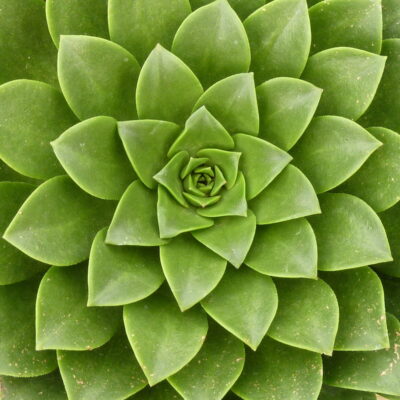
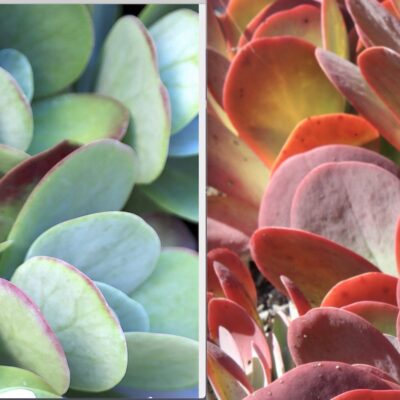
With the high summer heat at night, keeping Aeoniums going here in Phoenix is so hard. It is possible, but they don’t look good at all in summer. I do love seeing these new varieties.
Hi Nancy — I sure wish there was a way that these Canary Islanders would be happy where you are!
Aeoniums are some of my favorites. Such beautiful colors! And Altman is a great plant company. Looking forward to finding some of these beauties for my yard and planters! I’m in the middle of my yearly hanging plant cleaning up. Some of my hanging pots are looking pretty straggly and sad. And playing in the dirt is great mental therapy!
Hi Debbie — I was playing in the dirt today too! So nice with the ground soft from the rain. Unfortunately, I was going after a gopher, but still, there’s nothing like it.
I absolutely love Aeoniums! ♥️. All the beautiful colors. I do struggle with mine in the summer Georgia heat! Any suggestions?
Hi Deborah (I’ve always admired the “fancy spelling” of our name), Aeoniums typically don’t like high humidity and summer rainfall, but new crosses may be more tolerant. I hope so, because there’s not much you can do about humidity, short of growing them in a sunroom with a dehumidifier. It’s a shame they aren’t more widely grown (beyond coastal CA). But with high demand and given enough time for cross-breeding, I expect that to change.
HOW can I keep critters from munching on my Aeoniums? Moles, Voles, Rabbits, Rats, Ground Squirrels, OH MY! I feel like I’m being invaded!
Interesting, I have thousands of aeoniums, and nothing eats them except snails…which you didn’t mention! Gophers (also not an issue for you?) are a problem for me, and there’s been an uptick of ground squirrels. For small mammals I’m testing the use of sonic repellent devices
Hi. How will they do in North Central Texas?
Fine, in a greenhouse or sunroom.
Just bought 2 new aeoniums: “Green Wave” and “Superbang.” Green Wave looks like a cross between Emerald Ice and Mardi Gras. My favorites are Fiesta and Pink Witch. Another nice one is Aeonium Floresens.
Hi Joyce — I agree! I had to look up ‘Green Wave’ and ‘Superbang’. It’s amazing the cultivars on the Internet! I wonder how often the same plant is sold under a different name. Thanks for commenting. ;+) Debra
I just moved into a house in Van Nuys (Los Angeles) and there is a huge bed of Aeoniums. After much research I found out they are the Giant Red Aeonium named Cyclops (because of the large green eye surrounded by maroon). Apparently it is a hybrid of Aeonium Zwartkop and Aeonium Undulatum. I have only watered them once in five months and wonder if I should give them a soaking before summer sets in. They get a lot of morning sun but have shade for most of the afternoon. I moved from Dallas and don’t have much knowledge of succulents. Thank you for your interesting newsletters.
Hi Robin — Wow, a huge bed of ‘Cyclops’? Yes, water them, but not to the point the soil is soggy. They’re about to enter summer dormancy, and that will give them a boost. I have a photo of me holding one that’s nearly as tall as I am! Such cool plants.